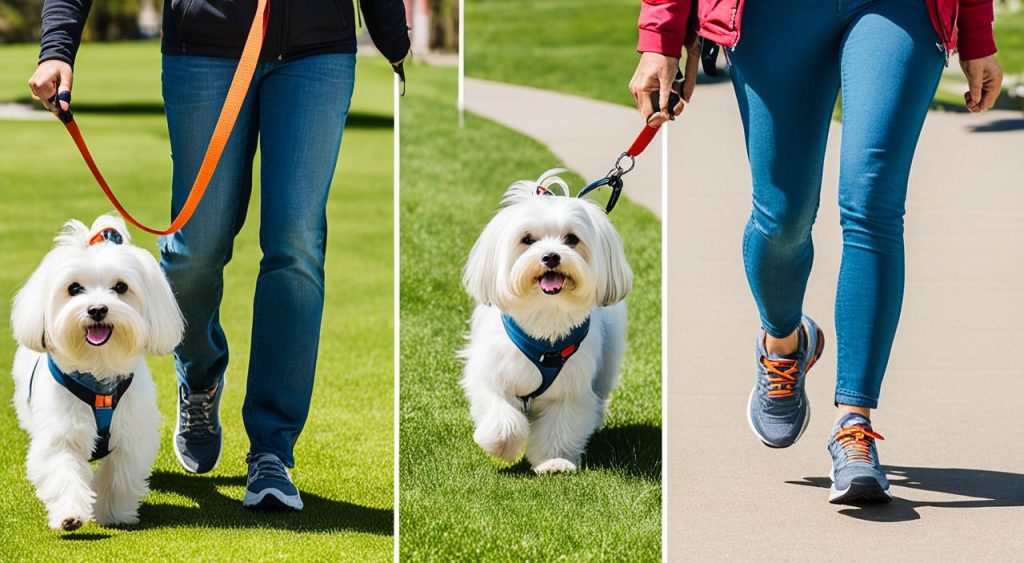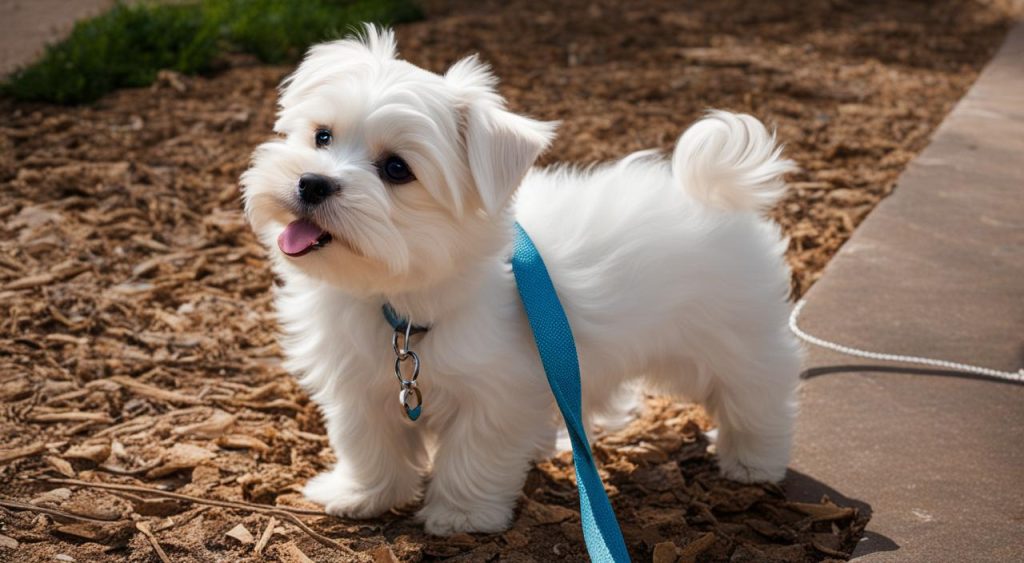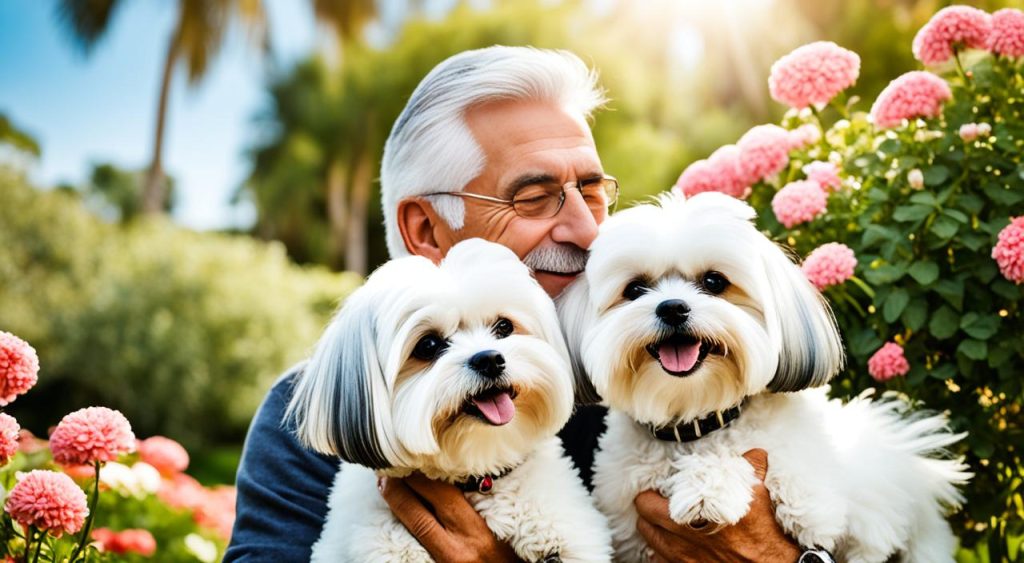Taking care of your Maltese includes providing proper exercise to keep them healthy and happy. Regular exercise is essential for their physical and emotional well-being. It helps maintain a healthy heart, circulation, and immune system, while also keeping their bones strong and muscles in good shape. Exercise also plays a role in regulating metabolism and promoting a healthy appetite. Additionally, regular walks satisfy a dog’s natural instincts and prevent restlessness or behavioral issues.
Maltese puppies can start going outside for exercise once they have received all their puppy shots, typically around 4.5 months of age. It is important to wait until this milestone to prevent potential exposure to infections or diseases. However, it is crucial not to over-exercise puppies as it may interfere with their growth plate development.
Key Takeaways:
- To maintain a healthy walking routine for your Maltese, it is recommended to schedule two walks per day of at least 20-30 minutes each.
- Other types of activity, such as fetch or interactive games, can also contribute to the exercise needs of a Maltese.
- Start exercising your Maltese puppy only after they have received all their puppy shots, typically around 4.5 months of age.
- Regular exercise contributes to the overall happiness and quality of life of your Maltese dog.
- Make sure to provide a safe and controlled environment for your puppy to prevent exposure to potential infections or diseases.
The Importance of Exercise for Maltese Dogs
Maltese may be small in size, but they still need exercise for their overall well-being. Regular exercise is vital for maintaining the physical and emotional health of Maltese dogs.
One of the key benefits of regular exercise is the maintenance of a healthy heart and circulation. Just like humans, Maltese dogs need to keep their hearts strong and their blood flowing properly. Exercise helps achieve this by increasing heart rate and improving cardiovascular health.
Not only does exercise benefit their heart, but it also boosts their immune system. Regular physical activity helps stimulate the immune system, making Maltese dogs more resilient to common illnesses and infections.
In addition to cardiovascular and immune health, exercise plays a crucial role in maintaining strong bones and proper muscle mass. Activities like walking, running, and playing encourage bone density and muscle development, which are essential for the overall strength and agility of Maltese dogs.
Exercise also plays a part in regulating metabolism and promoting a healthy appetite. When Maltese dogs engage in physical activity, it helps their bodies process and utilize food more efficiently. This can prevent issues such as obesity and promote a healthy weight.
Furthermore, exercise satisfies a Maltese dog’s natural instincts. Dogs are born with a need for physical activity and mental stimulation. Regular walks and other activities provide an outlet for energy and prevent restlessness or behavioral issues that may arise from a lack of exercise.
By providing regular exercise for your Maltese dog, you are contributing to their overall happiness and quality of life. A well-exercised dog is a content dog.
Remember, always consult with your veterinarian to determine the appropriate exercise routine for your Maltese. Each dog is unique and may have specific needs or considerations that should be taken into account.
When to Start Exercising Your Maltese Puppy
Exercising Maltese puppies is an important part of their development, but it’s essential to wait until they are ready. Typically, the ideal age to start exercising your Maltese puppy is around 4.5 months, after they have received all their necessary puppy shots. This cautious approach ensures that your puppy is protected from potential infections and diseases that they may encounter outdoors.
Newborn puppies receive antibodies from their mother that offer them temporary protection. However, as these antibodies wane off, vaccinations become crucial to provide proper immunity and protect their delicate system. It’s always recommended to consult with your veterinarian to determine the specific vaccination schedule for your Maltese puppy.
Another important consideration when starting to exercise your Maltese puppy is to avoid over-exertion. Puppies have a window of susceptibility in terms of their growth plate development, and intense physical exercise can potentially interfere with it. The growth plates are responsible for the growth and formation of the bones, and any disruption can have long-term consequences.
Creating a safe outdoor area for your puppy to exercise is also crucial. It’s important to provide a controlled environment that minimizes exposure to potential infections or diseases. Ensuring that the area is free from harmful substances, secure, and puppy-proofed will give you peace of mind while your Maltese puppy explores and gets their much-needed exercise.
Recommended Walking Frequency and Duration for Maltese Dogs
Maltese dogs require regular exercise to stay healthy and happy. A proper walking routine is essential to meet their exercise needs and provide mental stimulation. Here are some recommendations for walking frequency and duration:
Walking Frequency:
It is recommended to take your Maltese for two walks per day. This allows them to burn off excess energy and explore the world around them. A morning walk and an evening walk are generally ideal to provide a consistent exercise routine.
Walking Duration:
Each walk should ideally last for a minimum of 20 minutes, but it is suitable to extend it to 30 minutes if your Maltese is up for it. While longer walks or events with a lot of walking can be beneficial, it is important to incorporate regular breaks every 20 minutes. During breaks, allow your Maltese to rest and have access to water to stay hydrated.
When walking your Maltese, maintain a brisk pace that is comfortable for them. It’s crucial to consider the individual needs and stamina of your dog. Avoid overexertion or pushing them too hard, as this can lead to fatigue or injury.
Other Types of Activity:
Aside from regular walks, it’s important to provide additional types of activity to keep your Maltese engaged and mentally stimulated. Fetch games, interactive toys, and puzzle games are great options to incorporate into their exercise routine. These activities help stimulate their mind and provide a fun outlet for their energy.
Remember, a healthy exercise routine goes beyond just physical activity. Mental stimulation is equally important for the overall well-being of your Maltese. By incorporating regular walks and other stimulating activities, you can keep your Maltese happy, healthy, and entertained.
Other Types of Activity for Maltese Dogs
While regular walks are important for meeting the exercise needs of Maltese dogs, it’s also beneficial to engage them in other types of activities that provide mental and physical stimulation. These activities can be particularly useful when outdoor exercise is limited or when the weather is unfavorable.
Indoor movement can provide a valuable source of moderate purposeful activity for Maltese dogs. Although it’s not a substitute for outdoor exercise, engaging in activities that raise their heart rate and engage their muscles can help maintain their overall well-being.
One popular activity for Maltese dogs is fetch. This game not only provides physical exercise but also stimulates the dog’s mind as they chase after the thrown toy and bring it back. Playing fetch indoors can be a great way to provide exercise and mental stimulation even when outdoor space is limited.
Another engaging activity for Maltese dogs is find it games. This involves hiding treats or toys around the house and encouraging the dog to use their sense of smell to locate them. Starting with easier hiding spots and gradually increasing the challenge can keep the game exciting and mentally stimulating for the dog.
To effectively incorporate these activities into your Maltese’s exercise routine, it’s important to manage your time and plan exercise sessions accordingly. Set aside specific periods for these activities, ensuring that they are incorporated alongside regular walks. Timing exercise sessions can help ensure that the proper amount of moderate activity is achieved.
Conclusion
Regular exercise is crucial for the physical and emotional well-being of your Maltese. It helps maintain a healthy heart, strong bones, and proper muscle mass. Exercise also regulates metabolism and promotes a healthy appetite. Daily walks, at a brisk pace, are recommended to satisfy your Maltese’s natural instincts and prevent behavioral issues. Aim for two walks per day, each lasting at least 20-30 minutes. Additionally, incorporating other types of activity, such as fetch or interactive games, can help meet your Maltese’s exercise needs.
When starting to exercise your Maltese puppy, remember to wait until they have received all their puppy shots, typically around 4.5 months of age. Prioritize their safety by providing a controlled environment and avoiding over-exercising, which can interfere with their growth plate development. Always consult with your veterinarian regarding vaccination schedules and exercise guidelines for your young Maltese.
Remember to adapt your walking routine to different weather conditions to ensure the comfort and well-being of your Maltese. Regular breaks during walks, along with access to water and rest, are necessary. Additionally, while indoor movement should not replace exercise, engaging in moderate purposeful activity like fetch or find it games can provide mental and physical stimulation for your Maltese. By incorporating a variety of activities, you can meet your Maltese’s exercise requirements and contribute to their overall happiness and quality of life.





